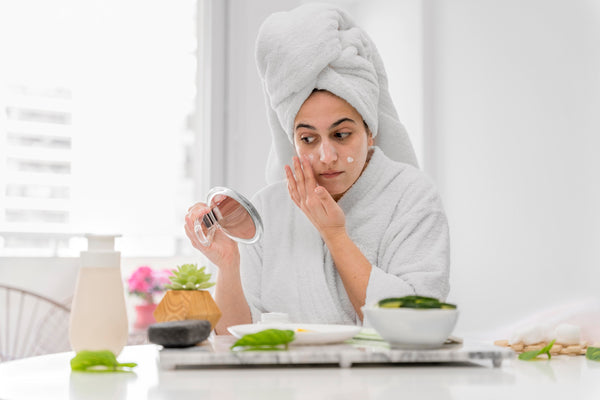Who doesn’t want healthy, glowing skin? After all, it is the largest organ in the body, which protects you from any kind of infection and illness by keeping germs, bacteria, virus, and other infection-carrying microbes away. Given that your face is the most exposed part of your body, you need to be privy of its health. Maintaining good skin health is a commitment that one needs to diligently follow through. But before you get on to that, let’s first look at the subtle signs your skin gives to better take care of it.
Signs of unhealthy skin
Your skin will inform you when it needs some tender love and care. When you experience extreme dryness or oiliness compared to the usual clogging of pores, skin darkening or discoloration, you know you have unhealthy skin. Before we start with our self care routine, we need to fully understand these signs of unhealthy skin. Let’s look at some of the unhealthy skin symptoms that warrant immediate attention.
Dry patches

During winter, it is fairly common for your skin to turn dry. However, if you are someone who is experiencing it very often, you may want to investigate it further to ascertain if it is actually just a consequence of seasonal change or indicative of a serious condition. Sometimes dry skin could occur due to changes in your skin’s top layer, which is also known as the epidermis.
As you age, the skin begins to thin and it ceases to retain moisture, which renders your skin dry and sometimes even scaly. Dryness causes skin to become itchy, which if not treated on time, can also begin to peel off. Furthermore, dry skin can be a reflection of poor gut health. Drink plenty of fluids and use a moisturizer to keep your skin hydrated. It would be advisable to visit a dermatologist if the symptoms are chronic, as it could be indicative of conditions like eczema and psoriasis.
Tanning
One of the most common signs of healthy skin is consistency in the tone all over. When you have unhealthy skin, you will notice patches of different skin tones in different areas on your face. These can be in the form of darkened or reddened patches all over the face. This can be due to excessive to the sun or hyperpigmentation as a result of aging. It’s always best to use a UV protected sunscreen before stepping out of your home to prevent tanning.
Excessively oily skin
Oily skin may not necessarily be a sign of unhealthy skin, but excessive accumulation of oil could clog your pores, resulting in acne. Sometimes, due to aging, hormonal imbalances, weight fluctuations or previous breakouts, your pores could stretch and become large, producing more oil. While it is not possible to shrink your pores, you need to take extra care to dab areas of your face with enlarged pores throughout the day to prevent acne. Sometimes, using the wrong skin product for your skin type can also result in oily skin and breakouts.
Dark circles 
Another common sing of unhealthy skin is severe dark circles around the eyes, which is a direct result of stress or lack of sleep. For dark circles, stay hydrated, minimize your salt intake, cover up on your sleep, manage stress levels, and use eye cream with Vitamin E in it.
If you fail to wash your face daily, use the wrong skincare routine or have poor hygiene habits, you can cause dirt or grime to build-up on the skin, eventually leading to clogged pores, dry skin, acne, blemishes, and wrinkles - all signs of unhealthy skin. If these signs are ignored, it could result in chronic skin problems. Make healthy lifestyle choices, consume collagen-rich foods, coupled with proper hydration and hygiene habits, to improve your skin health.
Additionally, try out Wellbeing Nutrition's Skin Fuel - India's First US Dermatologist Formulated Drinkable Skincare. Made using naturally derived, widely researched ingredients - L–glutathione, hyaluronic acid, Japanese collagen, and other essential vitamins, this delicious blueberry mint skin elixir is the perfect way to take care of your skin with an inside-out approach.
FAQs
1. What Are the Signs of Unhealthy Skin?
Unhealthy skin often shows signs like dryness, dullness, redness, acne breakouts, excessive oiliness, uneven texture, and premature wrinkles. Other indicators include dark circles, inflammation, persistent irritation, or slow wound healing, all of which may signal underlying health issues or poor skincare habits.
2. What Causes Unhealthy Skin?
Unhealthy skin can result from multiple factors, including dehydration, poor diet, excessive sun exposure, lack of sleep, high stress levels, and environmental pollutants. Using harsh skincare products, neglecting sunscreen, and not maintaining a proper skincare routine can also contribute to skin problems. Additionally, hormonal imbalances and certain medical conditions can impact skin health.
3. How Can I Improve My Skin Health?
To improve skin health, focus on a well-rounded skincare routine with gentle cleansing, hydration, and sun protection. Eating a balanced diet rich in antioxidants, vitamins, and healthy fats can nourish the skin from within. Staying hydrated, getting enough sleep, managing stress, and exercising regularly also help maintain a radiant and youthful complexion.
4. Can Lifestyle Changes Impact Skin Health?
Yes, lifestyle changes can significantly impact skin health. Reducing stress, following a nutritious diet, drinking enough water, maintaining a regular sleep schedule, and using the right skincare products can all contribute to healthier skin. Avoiding smoking, alcohol, and excessive sugar intake also helps prevent premature aging and skin damage.
References:
- Dry Skin Diagnosis and Treatment, American Academy of Dermatology Association, (https://www.aad.org/public/diseases/a-z/dry-skin-treatment)
- How to Control Oily Skin? American Academy of Dermatology Association, (https://www.aad.org/public/everyday-care/skin-care-basics/dry/oily-skin)
- What causes dark circles under the eyes? Fernanda Magagnin Freitag,
Tania Cestari October 2007Journal of Cosmetic Dermatology 6(3):211-5. DOI:10.1111/j.1473-2165.2007.00324.





























